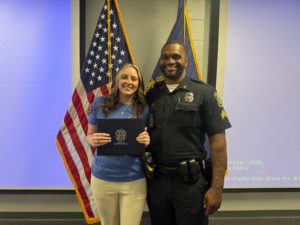Ten minutes of training can help a volunteer give a person who overdoses a second chance at life. It’s the driving premise behind UK College of Social Work’s Citizen Review Panel’s (CRP) decision to partner with advocates for overdose prevention and host programs to train community members in rural areas like Greenup, Kentucky.
Nearly 300 doses of the overdose prevention medication Narcan were distributed to volunteers who participated in a recent training event held at the First United Methodist Church in Greenup, Kentucky. In addition to UK College of Social Work, the Greenup County syringe exchange and Pathways to Go training mobile units were present at the event, with staff members on hand to help instruct attendees and distribute supplies. Event leaders also partnered with the Greenup County Health Department to provide fentanyl testing strips, all due to funding from a “HEALing Communities” state grant awarded to University of Kentucky.
The program’s success set the stage for a follow-on event to train volunteers and distribute Narcan during the Greenup Old Fashion Days festival on October 1.
Tackling the Problem
Citizen Review Panels (CRP) are groups that help evaluate the needs of their regional communities, by bringing together people who have been involved with the Child Welfare System in various ways. Their efforts are grassroot movements to better their communities, and often shine a light on overlooked issues that directly affect families and children. Northeastern CRP members recognized an increase in opioid addiction and overdose cases in their community, frequently resulting in children being separated from their parents or generally disrupting their lives. Events like overdose prevention training empower private citizens to help save lives and can give families affected by opioids a second chance.
Areas with entrenched drug use often face serious barriers to tackling the problem, but training volunteers to administer Narcan (also called naloxone) quickly in the event of an overdose can be critical to saving lives—especially in rural areas where first responders often must travel large distances to get to the person in distress. More than 80% of overdose deaths involve opioids, according to a recent CDC report, and nearly 40% of opioid and stimulant overdose deaths occurred while a bystander was present.
Driving Change Through Targeted Action
Significant efforts by volunteers and advocates, including social media promotions and billboard advertisements, helped boost awareness and ensure the community was able to come together for the program.
“We were maybe an hour into the event and there was a steady pace of people walking down the street who would stop off, do the training, get their Narcan, and go on.” Meagan Lederman, CRP Program Coordinator at the UK College of Social Work said. “The event went really smoothly.”
The training to properly administer Narcan usually takes less than ten minutes. In addition to the in-person instruction, attendees received a step-by-step guide for future reference.
Following the event’s success, the CRP Northeastern panel, supported by the UK College of Social Work, issued a report recommending trainings for first responders to showcase the benefits of addiction support programs and increase knowledge and buy in for smaller counties around the state.






